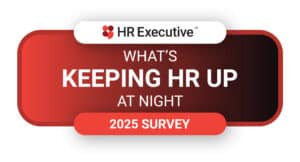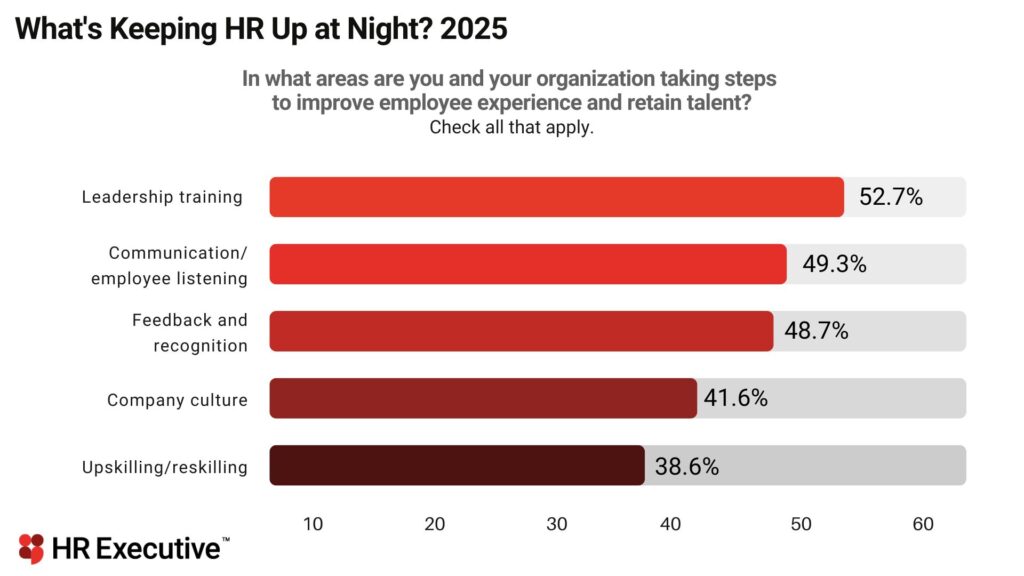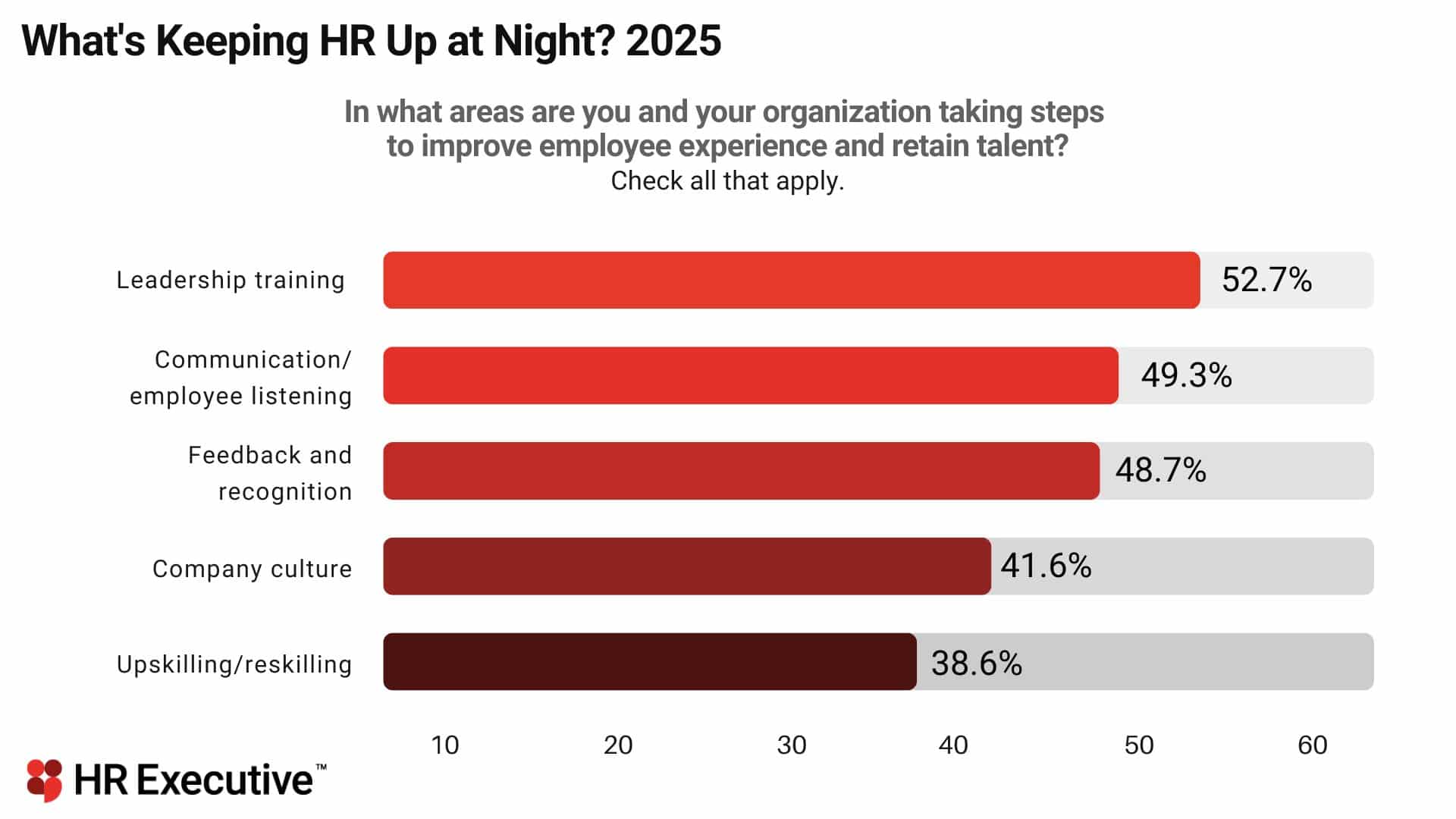Trust—it’s often considered the key to success in romantic and familial relationships. And now, new research points to the critical role trust will play in hiring and retention in 2025.
For context, consider what a lack of trust in interpersonal relationships looks like, says Jay Caldwell, chief talent officer at ADP. People are guarded, on their toes, feel like they can’t communicate authentically. “It makes a lot of sense” if that relationship suffers and ends, he says.
The same holds true in the workplace.
“Coming in, if you feel like you don’t trust the organization or its people, you’re less likely to give your best ideas, to share your best contributions openly and honestly—and you may potentially feel like you’re not safe,” Caldwell says. “So, when another organization comes calling, your probability of jumping ship is going to be much higher.”
HR leaders will be particularly attuned to that risk this year, as HR Executive’s What’s Keeping HR Up at Night? research points to ongoing concerns about hiring and retention in 2025. That has remained HR leaders’ most pressing challenge since the 2019 survey, when it claimed the top spot for the first time.
In 2024, about 32.5% of the approximately 400 HR professionals surveyed cited hiring and retention as their key priority. This is a figure that has declined steadily since the peak of the Great Resignation a few years ago—but is still 17 percentage points ahead of the next most common challenge (HR technology, a new entrant to the top five).
To ultimately get ahead of this perennial concern, Caldwell says, organizations need to concentrate first on building trust with employees and candidates.
ADP Research recently analyzed three years of monthly surveys of 2,500 U.S. workers to create the EMC Index—a measure of employee motivation and commitment—finding that those with the highest levels of trust at work were most motivated and most committed to the job.
According to the research, high levels of motivation and commitment were:
- 16 times more likely among workers who trust their teams;
- 26 times more likely for workers who trust managers and supervisors; and
- 41 times more likely among those who trust senior leaders.
While the pandemic “accelerated” the importance employees place on trust at work, he says, this was an already-evolving area, owing to shifting ideas about work in the past few decades.

“We have far fewer organizations today who look at all their workforce as lifetime employees, and we have far fewer employees who think they’ll make a career at the same organization over the next 30 years,” Caldwell says. “So, there’s more movement, higher turnover and people are much more inclined to pack up and leave than they were long ago—and that makes trust all the more important.”
3 opportunities to build trust and enhance hiring and retention in 2025
What does trust in the workplace look like?
Like in an interpersonal relationship, Caldwell says, three factors—autonomy, security and communication—can help employees establish trust with their teams, managers and leaders.
Freedom, flexibility and autonomy
Much of the conversation around trust in the workplace in recent years has focused on the push and pull between the popularity of remote work with employees and executives’ preference to have workers back in the office after the pandemic.
Organizations with strict return-to-office mandates could be eroding trust with current and future employees, Caldwell says.
“People don’t want to feel like they have a parent looking over their shoulder at work,” he says.
Yet, many do.
According to ADP’s research, 63% of those surveyed said they don’t get the freedom (ability to choose how work gets done), flexibility (where work gets done) and autonomy (when work gets done) they desire at work; only 12% said they have enough of each measure.
Leaders should take a big-picture view of freedom, flexibility and autonomy, Caldwell advises.
“[Focusing just on the return-to-office debate] can distract us as leaders from thinking about where else can we have flexibility?” he says. For instance, consider employees’ role in job design, access to tools to enable them to perform their roles and the training available to managers to ensure they’re focused on the work getting done—not necessarily how or from where.
“Those aspects of flexibility are even more important than location; even though it’s very important right now, it’s a very transactional factor,” Caldwell says.
Security
Leaders today can’t guarantee job security for all workers—particularly amid ongoing concerns about the economy. However, where possible, Caldwell says, they need to help their workforce see where their roles fit into the future of the company—and to believe leaders are committed to helping them be a part of that future.
That may mean helping employees understand how their jobs could evolve in the next three or five years given the impact of artificial intelligence, for instance, Caldwell says, and ensuring they have access to resources to develop the skills they’ll need in that environment.
It’s a focus many HR leaders are already prioritizing, according to HR Executive’s recent survey. When asked what steps they’re taking to bolster employee experience and retain talent, leadership training was the most common answer, with 53% pursuing this strategy. Nearly 40% are also focused on upskilling or reskilling the workforce.
“You have to think about how what you’re doing impacts people’s perceptions of security—the stories you can tell about the organization’s future and the actions that will help everyone get there.”
Communication
In HR Executive’s research, HR professionals are also prioritizing employee listening and feedback strategies to enhance retention, which Caldwell says is a key factor in building the trust organizations need to retain their talent.
 “Really good, intentional communication” starts with listening, he notes. Ensure multiple formal channels for collecting feedback and strategies are in place to respond meaningfully to employees’ views.
“Really good, intentional communication” starts with listening, he notes. Ensure multiple formal channels for collecting feedback and strategies are in place to respond meaningfully to employees’ views.
Consistent communication can also drive trust. Employees don’t want to see a last-minute meeting with a leader pop up. “That can be frightening; it needs to be done in a consistent tempo,” says Caldwell, noting company town halls and regular newsletters from leaders can help establish that cadence.
Extending trust to the candidate experience
Much of the strategizing that can boost trust with current employees can also translate to candidates.
For instance, as leaders help workers understand how their roles will change in the coming years, hiring and TA professionals can do the same with prospective employees—sharing how the role could change and ensuring they know how the organization will help them develop the skills needed for success.
Leverage storytelling, Caldwell adds, to help communicate how the company culture, vision and mission show up in employees’ day-to-day work. Strengthen that narrative by ensuring those involved in the hiring process are demonstrating that the organization prizes trust from its employees.
Hiring professionals who don’t respond to applicants or stop communicating through the process can inhibit any work the organization does to build trust with candidates and employees.
“Clear and predictable communication is a great way to show candidates they can trust you,” Caldwell says.
Related: Learn more about the results of HR Executive‘s What’s Keeping HR Up at Night? research.
Credit: Source link








![The state of inclusive marketing in 2025 [new data + expert insight] The state of inclusive marketing in 2025 [new data + expert insight]](https://www.hubspot.com/hubfs/inclusive-marketing-report.webp)


